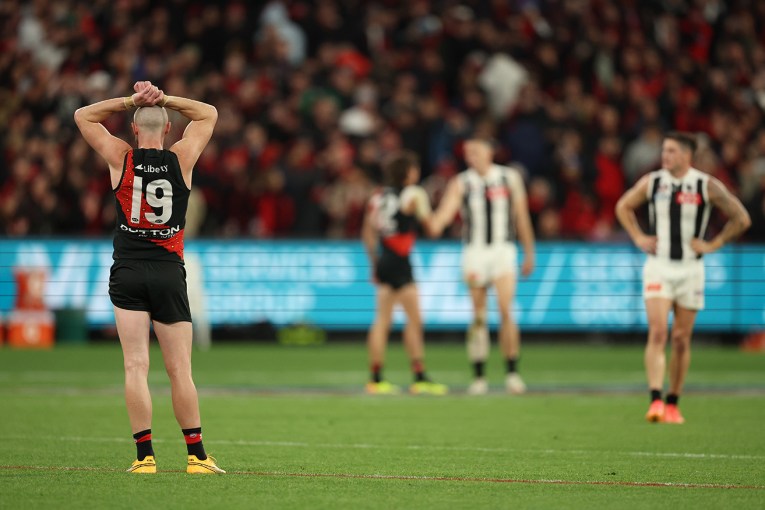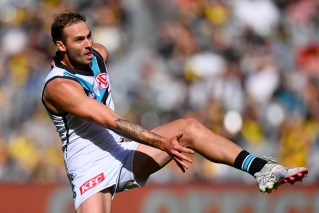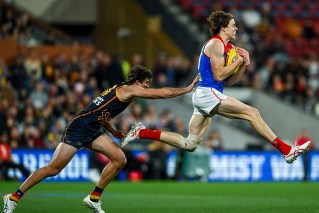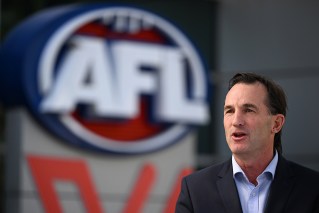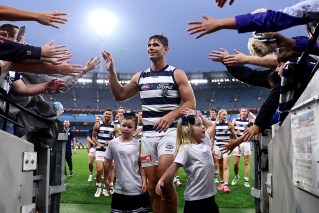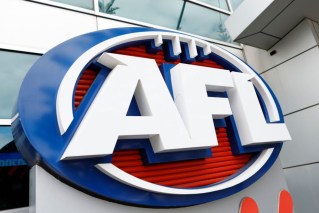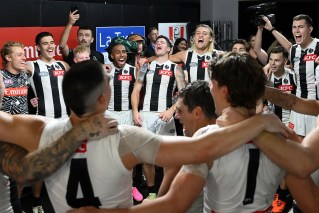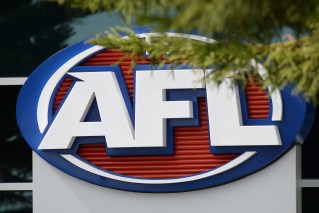Adelaide unites in grief, finally flying as one
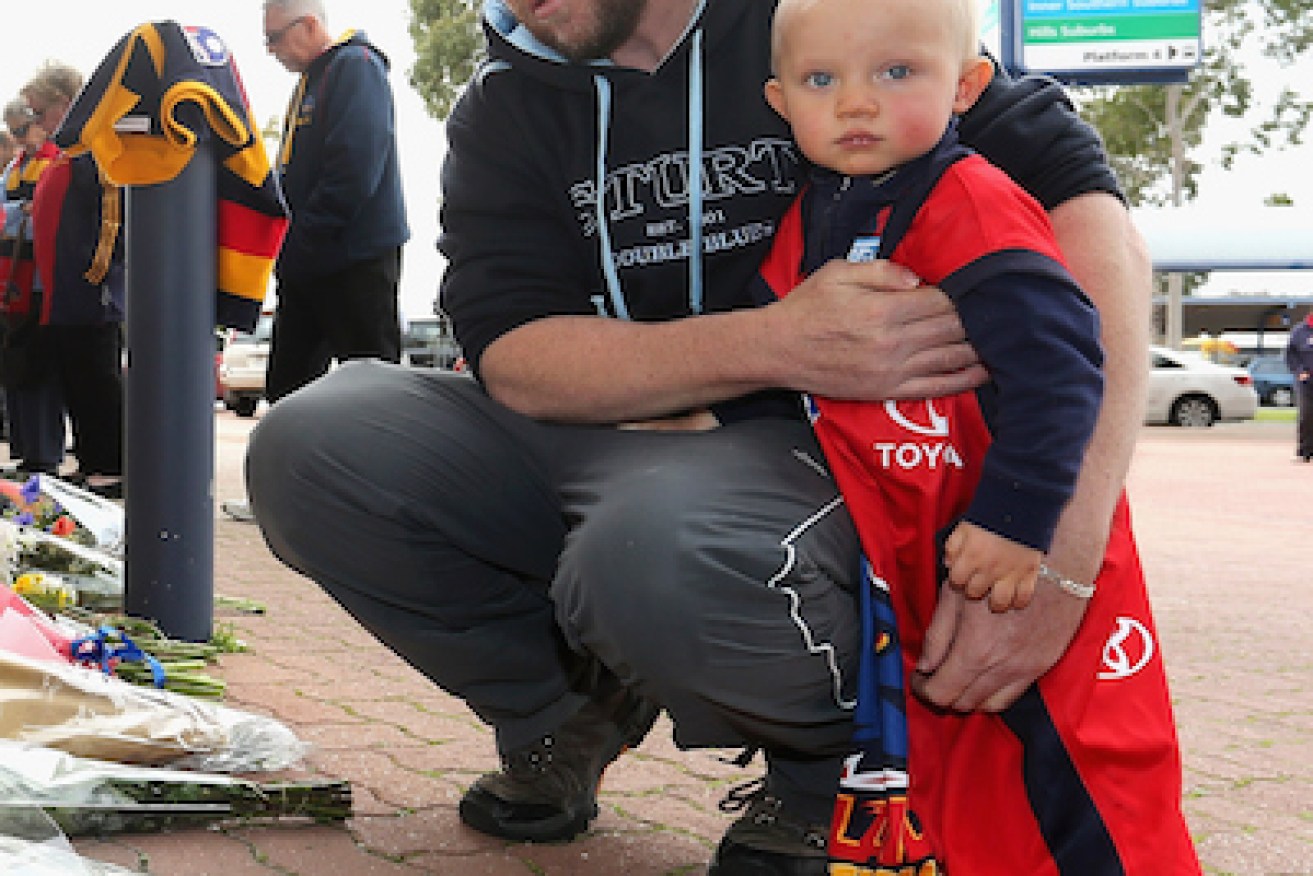
A tiny fan visits AAMI Stadium to mourn Walsh. Photo: Getty
Among the flowers, and the sea of red, blue and gold paraphernalia lovingly draped around the Adelaide Football Club’s headquarters, there is a football guernsey whose colours are rarely seen around the Crows’ West Lakes home.
Scrawled in texta across Port Adelaide’s black, white and teal fabric is a simple message: From all of us who feel the pain of loss and human suffering, we live in hope that again, someday soon, we shall all #FlyAsOne.
• Adelaide coach murdered, son arrested
• In pictures: Phil Walsh’s final season
• #PutYourScarvesOut campaign honours Walsh
The Crows’ social media slogan is usually only commandeered by Power supporters in mocking jest; it’s a rare moment when supporters of both teams stand so united, even in grief. But then, Phil Walsh was a rare breed.
In South Australia, there’s a line rarely crossed.

A footy echoes the sentiments of the Adelaide people. Photo: Getty
It’s the symbolic demarcation point that divides Alberton and West Lakes, respective haunts of the Power and the Crows.
It’s telling that Walsh not only crossed that line – walking out as a Port assistant to take the senior coaching reins at Adelaide – but managed to retain almost universal goodwill from the Power faithful in doing so.
For the jaded overnight crews manning the overnight scanners in Adelaide newsrooms, Friday morning’s alert must have been almost routine. Domestic dispute. 55-year-old man killed. 26-year-old son arrested.
And indeed it was routine. That is part of its tragedy.
As SA Police Superintendent Des Bray told the assembled media: “It’s just absolutely terrible when families are torn apart in such tragic circumstances.
“For any family, regardless of who it is, it’s one of the worst things you could imagine could happen to you.
“The only thing that’s different with this is that he has a high profile.”
Indeed. The coach of the Adelaide Football Club is probably seen, interviewed or discussed in the local media more times than the Premier or Prime Minister in an average week.
Walsh’s was an avuncular, unique presence in his frequent media appearances: gregarious yet inscrutable; he dubbed himself a “bogan from Hamilton” and a “weirdo”; he spoke of seeking elite standards and putting the team first, of winning groundballs and watching Sunflowers.
Cliché-weary football hacks spoke of him with bemused awe; they had not seen his like before.
Before AFL chief Gillon McLachlan’s Melbourne press conference yesterday, reporters chatted amiably amongst themselves. Over in Adelaide, their colleagues sat in stunned, funereal silence as they awaited the Crows chairman and CEO. In Adelaide newsrooms, reporters and sub-editors bashed out reams of copy, still grappling with what they were filing.

A tiny fan visits AAMI Stadium to mourn Walsh. Photo: Getty
South Australia is an AFL-obsessed state of some 1.7 million people, who divide their loyalties fiercely between just two teams. The Crows, a corporate composite assembled to thwart Port’s bid to join the national league, arrived in 1991 just as the economic edifice was crumbling. The State Bank collapsed. Debt and unemployment soared. And yet the team, somehow, won games. Premierships.
If the Crows have always carried a disproportionate amount of expectation on their collective shoulders, Phil Walsh’s burden was herculean. He was to be the club’s great white hope; touted as the strategic brains behind Port Adelaide’s 2004 success, the man who would finally tap the Crows’ nascent potential for a tilt at an elusive third flag.
As recently as last week, club legend Mark Ricciuto, the man instrumental in orchestrating Walsh’s appointment, privately avowed that “we’ve got a premiership coach here”.
We will now never know.
All of a sudden, the routine worries of Crows supporters – will we make the finals? can we beat Geelong? will Dangerfield re-sign or resign? – appear so insignificant as to become meaningless.
Crows chairman Rob Chapman called it a crisis so unprecedented there was no rule-book to explain how to deal with it.
“And we are dealing with it,” he insists. Somehow.
For Andrew Fagan, who began as CEO at the same moment Walsh started as coach, the only consolation is that “a football club is an environment extraordinary in its ability to wrap itself around those that need care”.
It’s a collective embrace that has enshrouded all of South Australia, as Crows and Port supporters finally fly as one — and cry as one.
Tom Richardson is a senior journalist with Adelaide’s InDaily
